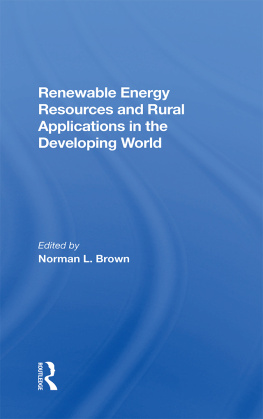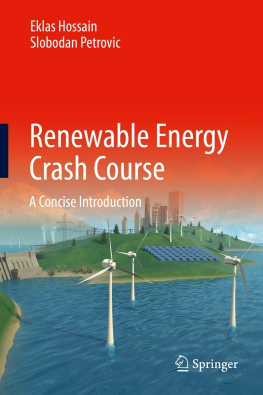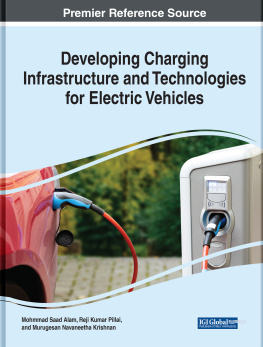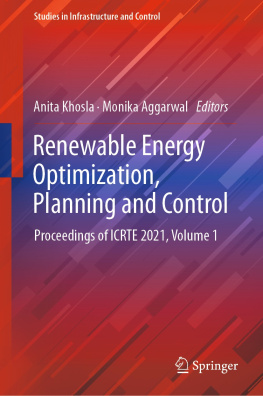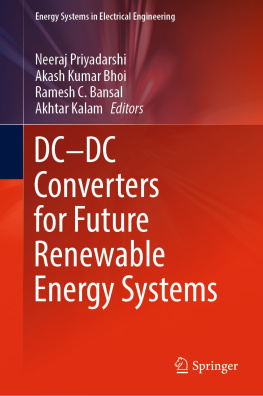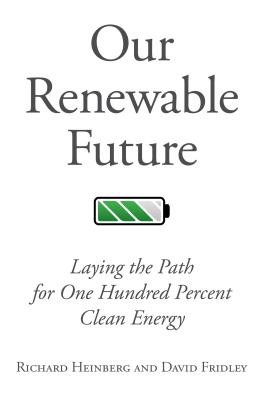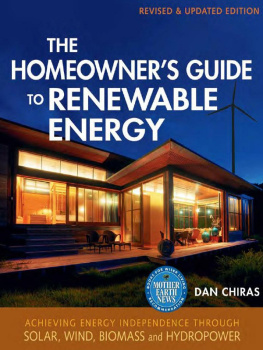Renewable Energy Resources and Rural Applications in the Developing World
AAAS Selected Symposia Series
Renewable Energy Resources and Rural Applications in the Developing World
Edited by Norman L. Brown
First published 1978 by Westview Press
Published 2019 by Routledge
52 Vanderbilt Avenue, New York, NY 10017
2 Park Square, Milton Park, Abingdon, Oxon OX14 4RN
Routledge is an imprint of the Taylor & Francis Group, an informa business
Copyright 1978 by the American Association for the Advancement of Science
All rights reserved. No part of this book may be reprinted or reproduced or utilised in any form or by any electronic, mechanical, or other means, now known or hereafter invented, including photocopying and recording, or in any information storage or retrieval system, without permission in writing from the publishers.
Notice:
Product or corporate names may be trademarks or registered trademarks, and are used only for identification and explanation without intent to infringe.
Library of Congress Number: 77-18549
ISBN 13: 978-0-367-28562-3 (hbk)
About the Book
The energy situation in developing countries is desperate. Because these countries are primarily dependent on fossil fuels--chiefly oil--for industrial growth, they have been hard hit by oil price increases. Further, in the rural areas, where most of the population lives, there are limited supplies of increasingly expensive diesel fuel or kerosene. Noncommercial energy sources such as firewood, dung, and agricultural residues are generally used in rural areas, but under the pressure of growing populations the forests are disappearing. This is resulting in a critical shortage of firewood for cooking and heating, as well as in the destruction of the environment. In addition, when dung and agricultural residues are burned, valuable fertilizers are destroyed. Thus, the rural areas--the sources of food and fiber--face a particularly alarming situation.
Small-scale, decentralized technologies for exploiting the sun's energy, received directly or as wind, flowing water, or biomass, provide potential solutions to the problem of rural energy needs, These technologies have been the subject of numerous studies, including two by the National Academy of Sciences. In this volume, members of the two academy study panels have joined with other experts to discuss the status of these technologies and to place them in a realistic context.
Contents
--Norman L. Brown
--Roger Revelle
-- George O. G. Lf
--Morton B. Prince
--Jos M. Miccolis
--Sharat K. Tewari
--Joseph J. Ermenc
-- John W. Powell
--Raymond C. Loehr
--Roger Revelle
The AAAS Selected Symposia Series was begun in 1977 to provide a means for more permanently recording and more widely disseminating some of the valuable material which is discussed at the AAAS Annual National Meetings. The volumes in this Series are based on symposia held at the Meetings which address topics of current and continuing significance, both within and among the sciences, and in the areas in which science and technology impact on public policy. The Series format is designed to provide for rapid dissemination of information, so the papers are not typeset but are reproduced directly from the camera copy submitted by the authors, without copy editing. The papers are reviewed and edited by the symposia organizers who then become the editors of the various volumes. Most papers published in this Series are original contributions which have not been previously published, although in some cases additional papers from other sources have been added by an editor to provide a more comprehensive view of a particular topic. Symposia may be reports of new research or reviews of established work, particularly work of an interdisciplinary nature, since the AAAS Annual Meeting typically embraces the full range of the sciences and their societal implications.
WILLIAM D. CAREY
Executive Officer
American Association for
the Advancement of Science
Norman L. Brown is country program specialist with the Office of International Affiars at the Department of Energy. As such, he is chief technical adviser to DOE's program of energy development with less developed countries. His international interdisciplinary background in science and technology, particularly energy and food problems, has involved him in seeking and encouraging appropriate technological solutions. He was the staff study director for Energy for Rural Development (National Academy of Sciences, 1976).
Joseph J. Ermenc , professor of engineering at Dartmouth College, specializes in mechanical engineering and the history and philosophy of technology development . He is the author of an 8-volume series, Dartmough Readings on Technology, and 58 volumes of interviews with outstanding innovators. He was a member of the MS panel that contributed to Energy for Rural Development (NAS, 1976).
Raymond C. Loehr , director of the Environmental Studies Program and professor of civil, environmental and agricultural engineering at Cornell University, has published over 100 technical papers and three hooks, including Agricultural Waste Management (Academic Press, 1974) and Land as a Waste Management Alternative, which he edited. He is also an advisor to various governmental and private organizations.
George O. G. Lf , director of the Solar Energy Applications Laboratory at Colorado State University and vice-president of the Solaron Corporation in Denver, is the author of over 100 books and papers on energy conservation, solar energy utilization, heat transfer, and environmental engineering. He is former president of the International Solar Energy Society and in 1976 received the Lyndon Baines Johnson Foundation award for contribution to the betterment of
mankind. He too was a member of the NAS panel on Energy for Rural Development.
Jos M. Miccolis is special assistant to the president of the National Council for Scientific Development of Brazil in Rio de Janeiro, and director of the Brazilian Science Policy Project at George Washington University. He is the author of several publications concerning energy policy in Brazil.
John W. Powell , director of the Technology Consultancy Centre at the University of Science and Technology in Kumasi, Ghana, has conducted, a six-year study of small industries in Ghana. He is the author and editor of two books in mechanical engineering.
Morton B. Prince is acting director for photovoltaics of the Division of Solar Energy at the Department of Energy. In 1954, he developed the Bell Solar Battery at the Bell Telephone Laboratories, and later developed commercial applications of the silicon photovoltaic cell at the Hoffman Electronics Corporation.
Roger Revelle is professor of science and public policy at the University of California, San Diego, and the Richard Saltonstall Professor of Population Policy at Harvard University. He is former president of the American Association for the Advancement of Science, a member of the National Academy of Sciences, and the recipient of numerous honorary degrees. His numerous publications in the areas of geophysics, national resource development, and population studies include Survival Equation: Man, Resources, and His Environment (Houghton Mifflin, 1971) and Population and Social Change (Crane-Russak, 1972), both of which he coedited.


